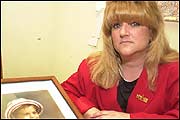UU tackles patient safety after tragedy
Ilene Corina of the South Nassau UU Congregation became an activist after her son's death in 1990.
Ilene Corina, a Unitarian Universalist living in Wantagh, N.Y., learned all about it the hard way in 1990 when her three-year-old son died after a hospital medical error following a routine tonsillectomy. At first, she said, she was in a state of disbelief. But then she got angry. Today, 16 years later, she is a leading national advocate for patient safety. She has helped push through state legislation, co-founded two organizations dedicated to the cause, and currently serves on the boards of four national health organizations.
The 45-year-old Corina, a former U.S. Postal Service employee, had never envisioned life as an activist. But after her son’s death she felt called to do something in the hope that no other families would have to have experiences like hers. And the South Nassau Unitarian Universalist Congregation (SNUUC) in the Long Island community of Freeport, of which she is a member, has supported her every step of the way.
Raised Jewish, Corina started attending the Freeport congregation in 1986 just before her son was born. “I fell in love with it,” she said about her discovery of Unitarian Universalism. “Religion is often used to separate people,” she said. “But Unitarian Universalism helps bring them together.”
In the difficult years after her son’s death, Corina sought support from others who had suffered similar events. She discovered an organization in Colorado that provided support for medical error survivors—Persons United Limiting Substandards and Errors in Health Care (PULSE)—and decided to start a New York branch. Other branches were later established in other states, leading to the creation of PULSE of America—a national organization that Corina co-founded.
Initially the Freeport congregation provided space for PULSE groups to meet, and congregants have continued to actively support PULSE by attending meetings, raising money, and collecting medical statistics. Corina enlisted youth participation through a presentation to the church youth group and got volunteers to design a series of brochures and to help out at a 26-mile Patient Safety Run. “If I hadn’t been a member of SNUUC, there would be no PULSE,” Corina said.
Corina is on the board of governors of the National Patient Safety Foundation (founded by the American Medical Association with other groups), a committee member of Reduce Infection Deaths, and a board member of the Joint Commission on Accreditation of Healthcare Organizations and of the Sorry Works! Coalition. In March 2002, she spearheaded National Patient Safety Awareness Week through the National Patient Safety Foundation. In addition, she helped pass New York’s Patient Health Information and Quality Improvement Act in 2000, has given presentations at more than 30 medical conferences, and published her first article in the American Journal of Nursing in 2005.
She began her involvement in patient safety advocacy by attending a conference of the National Patient Safety Foundation. When she heard the speakers discussing medical errors, it was as if a light turned on for her. “They knew,” she said of her sudden realization that there were people working for improvements in this area. “It was a healing moment.”
While PULSE provides information for those who think about suing, they do not advocate this particular route. “The large settlements that you hear about in the media are very rare,” she said. “While a jury might award a multimillion dollar settlement, it is often appealed. And those who do get it really need it. They’re not using it to go on a cruise.”
Modest to a fault, Corina doesn’t relish her role in the spotlight, speaking at conferences and meetings. But there’s no turning back. “I’d love to walk away,” she said, “but I can’t.”
See sidebar for links to related resources.








